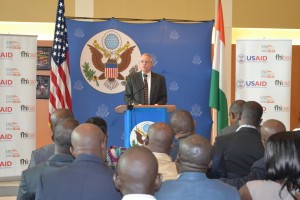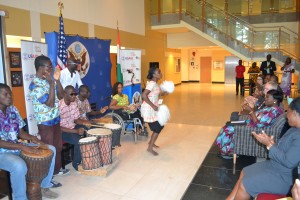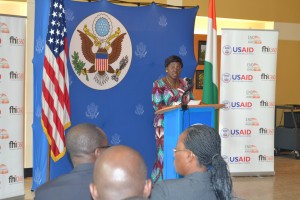END in Africa Project Launches in Côte d’Ivoire: USAID Hosts Opening Ceremony at US Embassy
December 17th, 2015

Mr Andrew Haviland, Chargé d’Affaires of US Embassy in Cote d’Ivoire, presides over the END in Africa project launch ceremony. Photo: FHI360
USAID marked the official launch of its END in Africa project in Côte d’Ivoire (the Ivory Coast), with a ceremony at the US Embassy in Abidjan on Monday, December 7, 2015, presided by Andrew Haviland, US Chargé d’Affaires and Dr Conombo Diabaté, Côte d’Ivoire’s Deputy Director General for Health.
The END in Africa project works toward the control or elimination of five debilitating neglected tropical diseases (NTDs)—lymphatic filaraisis, trachoma, onchocerciasis, schistosomiasis and soil-transmitted helminthes—in various West African countries. It is financed by USAID and administered by FHI360, which also supports three other US-financed projects in Côte d’Ivoire that focus on various aspects of HIV/AIDS prevention, care and treatment (ISPEC, FANTA-III, and LINKAGES).
With its FY 2016 entry into the END in Africa project, Côte d’Ivoire joins five other West African countries—Burkina Faso, Ghana, Niger, Sierra Leone and Togo—all of which have received USAID support through the project since 2010. Through the END in Africa project, USAID’s goal is to help the countries it supports to meet the 20/20 global goal of NTD elimination and control.

A troupe of talented blind and disabled artists performs at the END in Africa project launch event, bringing light to the country’s NTD burden. Photo: FHI360
“USAID wants to be a major contributor to better health for the population of Côte d’Ivoire, and to relieve people in the country from the burden of NTDs,” said Mr. Haviland.
NTDs affect a large percentage of the population in Côte d’Ivoire. In more than a third of the country’s health districts (28 of 82), over 20% of the population suffers from intestinal worms (soil-transmitted helminths, or STH). STH also affects smaller percentages of the population in every other health district in the country.
Between 10-50% of the population in almost half the country’s health districts (40) suffer from chronic snail fever (schistosomiasis), which causes malnutrition, anemia and learning difficulties in children and can lead to organ damage in children and adults, alike. In a few districts, over half the population suffers from this disease, which is found in almost every health district in the country (80 districts).
Elephantiasis (lymphatic filariasis, or LF), which causes painful, disabling swelling in the body, affects people in almost three-quarters of the country’s health districts (61), and most (54 districts) are also reservoirs for river blindness (onchocerciasis, or oncho). While trachoma, which can also cause blindness, is found in many districts in Côte d’Ivoire, the extent of the problem is still unknown, since 72 districts are still in need of mapping.

Dr Conombo Diabaté, Deputy Director General for Health, Ministry of Health and the Fight against HIV/AIDS (MSLS), Cote d’Ivoire. Photo: FHI360
“It’s heartbreaking to see so many people still suffering from these diseases when simple medications can stop their transmission and even eliminate them,” said Dr Diabaté. Referring to financial and technical constraints that have long hindered the country’s fight against NTDs she continued, “this new partnership with USAID will help fill a very large gap for Côte d’Ivoire and alleviate much suffering among the population.”
International partners and donors have only been involved in supporting NTD treatment in Côte d’Ivoire since 2012, and their support has been relatively sporadic and less than comprehensive. This is expected to change with the entry of the country into the END in Africa project, which intends to provide full support for NTD prevention, control and elimination in Côte d’Ivoire in the coming years.
In FY 2016, End in Africa will support the health ministry (MSLS) in reaching over 12.3 million people in 38 districts with integrated NTD treatment for LF and oncho. It also expects to reach almost 440,000 people with snail fever medicine, almost 1.1 million people with medicine for STH, and almost 620,000 people with medicine for trachoma. The project includes plans to support trachoma mapping in 72 districts to gauge the extent of the problem.

